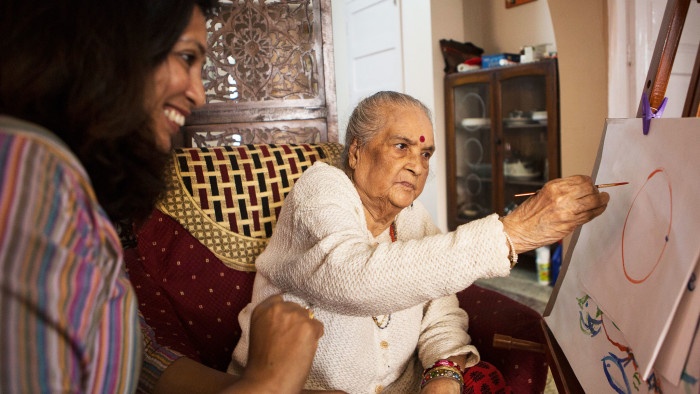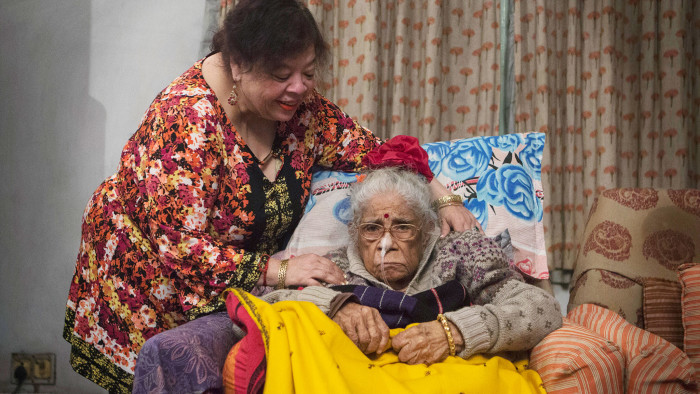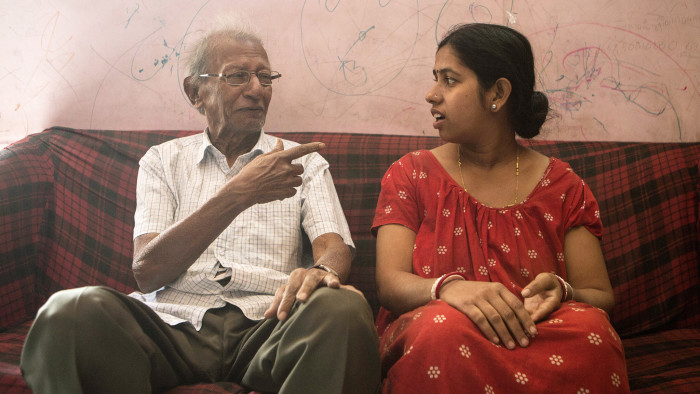How families in India are filling the gaps in dementia care
Roula Khalaf, Editor of the FT, selects her favourite stories in this weekly newsletter.

This story is part of the Financial Times Seasonal Appeal for Alzheimer’s Research UK, which is raising funds for pioneering research to develop new treatments for dementia. You can support the appeal here
Julie Banerjee Mehta, an Indian academic based in Canada, was hurled into the world of Alzheimer’s disease in a single, savage moment 10 years ago.
Her father had just returned home from hospital, and the family were gathered in their Kolkata home for a belated birthday celebration. Poised to cut the cake, Ms Mehta’s mother — a retired doctor — stared at her husband, then asked agitatedly: “Who is this man? You have brought an imposter in the house.”
A day later, doctors confirmed that Ms Mehta’s mother, Anima Banerjee, then 87, was suffering from Alzheimer’s. If there had been early warning signs or milder symptoms, they had been missed, or perhaps dismissed as the routine troubles of old age.
“My mother was the ideal of the superwoman,” recalls Ms Mehta, who was visiting Kolkata at the time. “When she couldn’t recognise my father, I felt the earth had moved under my feet.”
In the following weeks, Dr Banerjee repeatedly attacked her husband — her medical school sweetheart — convinced he was an intruder. She had to be moved to a separate bedroom, under constant watch. “For the life of her, she could not understand who this man was,” says Ms Mehta. “We were scared for his life.”
India may be a young country, with 65 per cent of its 1.25bn people under the age of 35, but more than 80m Indians today are over the age of 65.
Of those, more than 4m are estimated to be suffering from Alzheimer’s and other forms of dementia, giving the country the third highest caseload in the world, after China and the US.
India’s dementia and Alzheimer’s burden is forecast to reach almost 7.5m by 2030, as its senior population rises. But public services for the aged are almost non-existent in India, and private eldercare is still in its nascent stages.

With an increasing number of women in the workforce and traditional joint families breaking down due to migration, caring for those with dementia poses serious challenges. There are fears of a looming healthcare crisis. “Ageing is never taken seriously by policymakers, who assume that families will take care of the old persons,” says Dr Jacob Roy, the founder of the Alzheimer’s and Related Disorders Society of India. “Unfortunately, that is not happening. India is changing — the traditional carers are not there.”
Alzheimer’s in India is still a largely hidden problem; Dr Banerjee is one of just a tiny fraction of patients that are ever formally diagnosed or treated. Most Indians still consider memory loss and confusion an inevitable part of ageing, rather than signs of a degenerative disease.
Tell us your story
Has someone in your family been affected by Alzheimer’s?
Tell us about your experience with the disease here.
Join Dementia Research
Anyone can help. Click here to find out how
“Families often refuse to consult a doctor,” says Mala Kapur Shankardass, Asia chair for the International Network for Prevention of Elder Abuse. “There is a mindset against treating people for dementia. They think ‘no matter what you do, you can’t get away from it, so what’s the point?’”
But the lack of diagnosis hurts. When elderly Indians get agitated, act out, or angrily complain about care — common Alzheimer’s symptoms — they can be perceived as being deliberately difficult or obstinate, generating fierce tensions within a family.
“If you do not treat it as a disease, but as a temperamental thing, difficulties arise,” says Ms Shankardass. “Some people see it as a personality clash. There is a likelihood of abuse, mistreatment or neglect of older people because of this.”
Dr Roy says proper diagnosis — and counselling for the family — improves the quality of care, helping frustrated, resentful relatives to be more compassionate and patient.
“The moment the doctor says, ‘Your father has got a progressive disease of the brain,’ their whole attitude changes,” Dr Roy says. “It makes it easier for the care-givers to take care of them. Until then, they were just groping in the dark. It changes the dynamics in the family.”
The ARDSI is working to raise awareness of Alzheimer’s and encourage treatment of symptoms. Yet stigma is a deterrent. “People also think it could be hereditary, and they don’t like to confess that somebody in their family has it,” says Ms Shankardass.
The majority of elderly Indians live at home, mostly with spouses or their adult children, but also sometimes alone, or attended to by full-time maids.

Dilip Sarkar, a widower with obvious Alzheimer’s symptoms, is cared for by Radha Gharami, 35, a maid who has worked in his house for more than two decades. “My life is now restricted to this flat,” she says. “I am the only one who can handle him.”
When Mr Sarkar gets agitated and angry, he sometimes throws things at her, and she threatens to quit. But neighbours plead with her to stay, as does his daughter who calls in from abroad. “I have this attachment,” she says.
For other families, an Alzheimer’s patient can literally tear their former lives apart. After her father died in 2012, Ms Mehta felt compelled to leave Canada and return to her mother. “I was half here and half there,” she said. “It was too much. I thought I was going to have a breakdown.”
Laily Thompson, who grew up in Kolkata, was a senior human resource manager at Transport for London when her mother was diagnosed with Alzheimer’s. Initially, she and her sister in the US took turns flying home every few months.
After intensive soul-searching, Ms Thompson, 53, quit her job and returned to Kolkata. As much as their mother, it was their father who badly needed their presence and support. “My father was depressed,” Ms Thompson says. “When you can’t have a conversation with your life partner, it’s really hard.”
Her father died a few months later, but she is now looking after her 89-year-old mother, though the elderly lady hardly recognises her. “She forgets that I am her daughter,” says Ms Thompson, “but she knows I’m somebody special.”
• Your gift will be doubled
If you donate to Alzheimer’s Research UK through the FT’s Seasonal Appeal, Goldman Sachs has generously agreed to match it up to a total of £300,000. Click here to donate now

Comments